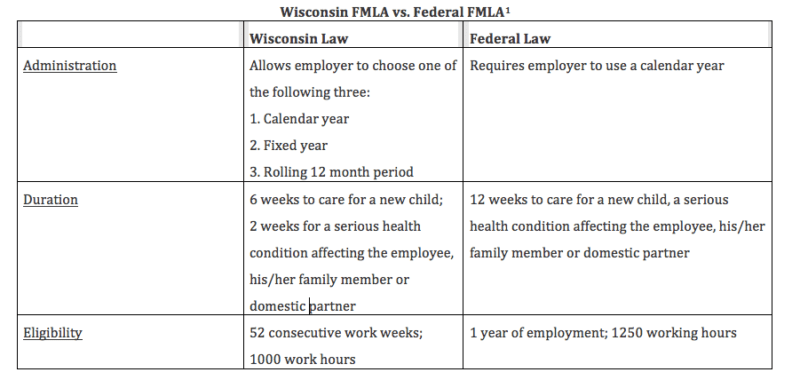FEDERALIZING WISCONSIN’S FMLA
Small business owners do it all. From payroll to pitching new clients, small business owners are at the helm of daily operations, which includes understanding and properly administering employee benefits, such as FMLA.
The Family Medical Leave Act, otherwise known as FMLA is considered a ‘protected’ leave of absence, meaning that an employer cannot terminate an employee for requesting or taking a leave of absence. Furthermore, an employer must maintain the position, or a similar position, to which the employee may return once their leave has ended.
In 1988, Wisconsin led the nation in employment law reform when then Governor Tommy Thompson signed the state FMLA, requiring eligible employers to provide six (6) weeks of unpaid leave per year for eligible workers to care for a new child, and two (2) weeks of unpaid leave to care for the employee’s own serious health condition or that of a family member or domestic partner.
Wisconsin remained one of the few states with family medical leave until 1993, when congress passed a federal version of FMLA, providing 12 (twelve) weeks of annual unpaid leave to care for a new child, receive treatment for a serious medical condition or care for a sick family member.
Unfortunately, passage of the federal law resulted in confusion for both employee and employer alike. The language and definitions used in the two laws are very different, creating a difficult compliance process for Wisconsin’s small business owners.
Administering FMLA is a document-intensive process, as employers are required to obtain the proper certification from medical providers regarding an employee’s leave, as well as the duration. Documentation can also be ongoing, depending upon the specific situation.
Mistakes in FMLA don’t just result in extra work; they can be costly. The state and federal FMLA have many conflicting provisions that often lead to lingering doubt for employers about running afoul of these confusing guidelines. Wisconsin Small Businesses United supports measures to federalize Wisconsin’s FMLA law in order to significantly reduce the risk of litigation, cost of compliance and well-known frustration associated with administering this burdensome and duplicative law.

